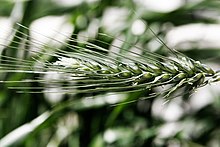awn
Jump to navigation
Jump to search
See also: awn.
English
Etymology
From Middle English aw(u)ne, agune, from Old Norse ǫgn (compare Danish avne), from Proto-Germanic *aganō, *ahanō (“chaff”) (compare Old English agnu, Dutch agen, German Ahne, Agen), from Proto-Indo-European *aḱanā (compare Latin agna (“ear of wheat”), Lithuanian ašnìs (“edge, blade”), Czech osina, Ancient Greek ἄκαινα (ákaina, “spike, prick”), ἄκανος (ákanos, “pine-thistle”), Sanskrit अशनि (aśáni, “thunderbolt, arrow tip”)), from Proto-Indo-European *h₂eḱ- (“sharp”). More at edge.
Pronunciation
- IPA(key): /ɔːn/
- Rhymes: -ɔːn
- Homophones: en (cot–caught merger); on (Southern US, Midland US or cot–caught merger)
Noun
awn (plural awns)

Derived terms
Translations
the bristle or beard of certain plants
|
Anagrams
Middle Welsh
Pronunciation
Verb
awn
- inflection of mynet:
Portuguese
Pronunciation
Interjection
awn
Scots
Determiner
awn
References
- “awn, adj., n.” in the Dictionary of the Scots Language, Edinburgh: Scottish Language Dictionaries.
Welsh
Alternative forms
- (first-person singular conditional): elwn
Pronunciation
Verb
awn
- inflection of mynd:
Mutation
| Welsh mutation | |||
|---|---|---|---|
| radical | soft | nasal | h-prothesis |
| awn | unchanged | unchanged | hawn |
| Note: Some of these forms may be hypothetical. Not every possible mutated form of every word actually occurs. | |||
Categories:
- English terms inherited from Middle English
- English terms derived from Middle English
- English terms derived from Old Norse
- English terms derived from Proto-Germanic
- English terms derived from Proto-Indo-European
- English 1-syllable words
- English terms with IPA pronunciation
- Rhymes:English/ɔːn
- Rhymes:English/ɔːn/1 syllable
- English terms with homophones
- English lemmas
- English nouns
- English countable nouns
- Middle Welsh terms with IPA pronunciation
- Middle Welsh non-lemma forms
- Middle Welsh verb forms
- Portuguese 1-syllable words
- Portuguese terms with IPA pronunciation
- Portuguese lemmas
- Portuguese interjections
- Portuguese terms spelled with W
- Portuguese internet slang
- Portuguese terms with usage examples
- Scots lemmas
- Scots determiners
- Scots possessive determiners
- Scots terms with obsolete senses
- Welsh terms with IPA pronunciation
- Rhymes:Welsh/au̯n
- Rhymes:Welsh/au̯n/1 syllable
- Welsh non-lemma forms
- Welsh verb forms
- Welsh literary terms
